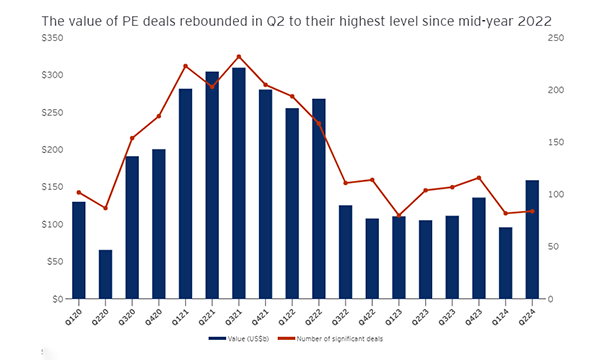
You have likely strolled through the market filled with bustling colors and fresh produce of fruits and vegetables.
But have you ever imagined a market where the goods aren’t oranges and apples, but rather companies and entire businesses worth billions of dollars?
Welcome to the world of Private Equity and Mergers & Acquisitions.
The combination of these two forces greatly enhances and positions the companies for growth and innovation, and helps them do new things.
In this article, we will examine the workings of these forces, what strategies they implement, what tactics they follow, and what acquisitions to change the landscape of the entire business sector.
The private equity investment plays a prominent role in M&A transactions.
PE firms are catalysts for business transformation, often buying businesses, restructuring them, and driving profitability before selling these companies to other firms or taking them public.
They sometimes merge those companies with other companies within their portfolio to scale and enhance competitive advantage.
Acquiring Non-Performing Assets: PE firms identify companies that are non-performing but have growth potential.
They acquire such companies through an M&A deal, inject capital, and streamline operations.
One of the most common entry points in M&A for PE firms is a leveraged buyout (LBO), whereby equity and borrowed funds are used to acquire a company, using the assets or cash flows from the acquired company as collateral for the borrowed capital.
Exit Strategies: M&A today has become an even more prominent exit vehicle for PE firms.
The PE firm sells the company, after restructuring it appropriately, through a strategic sale or an IPO.
Traditionally, M&A deals in operating companies are often seen to focus on obtaining strategic synergies.
PE-backed M&A instead looks towards restructuring for financial benefits as well as operational enhancement rather than mere strategic leverage.
Differences in the above goals lead to varied deal structuring, negotiation strategy, and risk share.

The M&A transactions, especially PE, involve acute regulatory compliance and are cushioned by a plethora of laws, including competition law, securities law, and corporate law.
Antitrust laws, fair trading practices, and corporate governance standards come into focus through the regulation of those deals.
Hence, students of corporate law and M&A law professionals have to clearly understand that a legal framework is necessary in order to deal with the intricacies involved in PE-backed M&A transactions.
Before we know about the significant role of Due Diligence in Private Equity M&A, know what Due Diligence is.
It’s a process or effort you make to collect and analyze information before you decide on purchasing and soldering the assets or a company so you can avoid potential risks and make the best choice.
With this definition of this term, you surely get an idea of its role in Private Equity M&A; you can know the nature of the deal, risks, and challenges involved in it, and know if the deal fits with your portfolio or not.
Private equity is more like investors who assist the companies in bringing their expertise and financial resources to drive both and create value.
In simple terms, they help the companies in purchasing other companies by investing the required money for the deals, and for the low-value company to raise its valuation for the profitable deal.
Small companies mainly benefit from it as it helps them compete with the bigger companies by providing them the business knowledge and resources.
After its acquisition, the private equity firm will initiate integration strategies that can create synergies.
They enhance efficiency, reduce cost, and therefore raise revenue, and compared to conventional corporate M&A activity, synergy is not more often associated with market expansion or the diversification of products.
Do You Know?
The origins of the modern private equity industry trace back to 1946 with the formation of the first venture capital firms.
Bear in mind when you have a solid grasp of legal requirements, it empowers informed decision-making, prevents litigation, and supports sustainable growth.
Thus, understanding the legal aspects of private equity and M&A transactions is pivotal.
However, in case of any problem, don’t hesitate to hire a lawyer to help you in dealing with these things.
The growing private equity-driven M&A deal volumes command a resultant and increased demand for special legal expert services.
Corporate lawyers, who specialize in M&A law, are highly in demand, and students who may find this to be an area of interest in legal studies must take courses on corporate law, financial regulations, and M&A law since these courses would equip them with the relevant, in-depth knowledge of the legal complexities surrounding deal-making, regulatory compliance, and dispute resolution through M&A transactions.
In addition, more regulatory changes, more compliance problems, and more complexities exist on the border.
As a result, these people need skills both in local and international legal frameworks.
Concerning the above information, we can say that the intersection of private equity and mergers & acquisitions from the perspective of the ever-altering environment in which businesses operate is stimulating.
Private equity players have been discovering growth potential in particular assets and companies, and helping them in the expansion of their growth by combining them with other businesses through mergers and acquisitions.
This space can only be successfully managed by understanding the challenges and opportunities involved in it.
Subscribe to our newsletter and get top Tech, Gaming & Streaming latest news, updates and amazing offers delivered directly in your inbox.